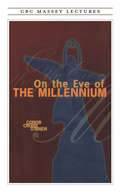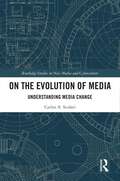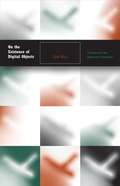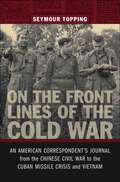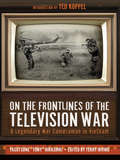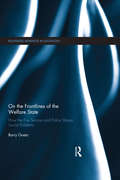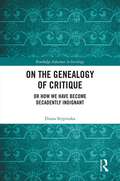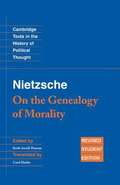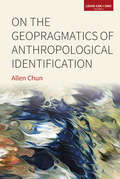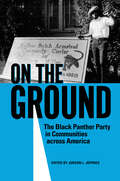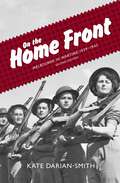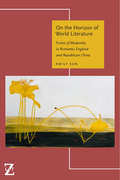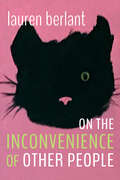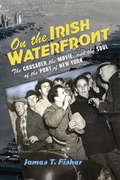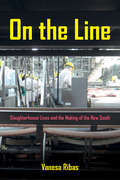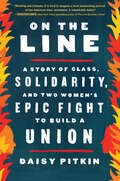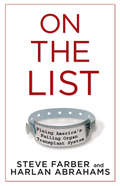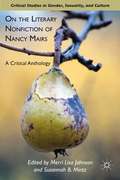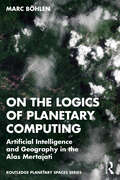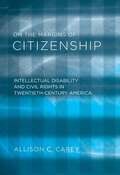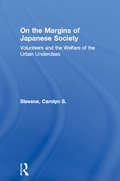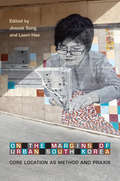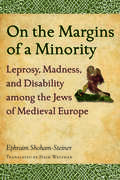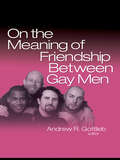- Table View
- List View
On the Eve of the Millennium (The CBC Massey Lectures)
by Conor Cruise O'BrienConor Cruise O'Brien, respected journalist, diplomat and statesman, considers threats to the Enlightenment tradition from which modern society derives threats he considers serious enough that the tradition and its institutions might not survive even a third of the next millennium.
On the Evolution of Media: Understanding Media Change (Routledge Studies in New Media and Cyberculture)
by Carlos A. ScolariThis book describes the lifecycle of media in the context of the media ecology, presenting a general theoretical framework and a series of methodological procedures to support the construction of an eco-evolutionary approach to media change. Focusing on a series of processes - emergence, competition, dominance, hybridization, adaptation, extinction - this book goes beyond a chronological approach to propose a reticulated and multi-layered conception of media evolution. If media evolution is a network, what are the relationships between "media species" like? What happens when a new media emerges into the media ecology? How do new media influence the old ones? Can media become extinct? How do media adapt when the social and economic context changes? How can media evolution be analysed? What kinds of quantitative and qualitative techniques can be applied in media evolution research? By presenting an innovative research approach and theoretical framework to media studies, this book will be of keen interest to scholars and graduate students of new media, media history and theory, philosophy of technology, mass communication, and organisational studies.
On the Existence of Digital Objects (Electronic Mediations #48)
by Yuk HuiDigital objects, in their simplest form, are data. They are also a new kind of industrial object that pervades every aspect of our life today—as online videos, images, text files, e-mails, blog posts, Facebook events.Yet, despite their ubiquity, the nature of digital objects remains unclear.On the Existence of Digital Objects conducts a philosophical examination of digital objects and their organizing schema by creating a dialogue between Martin Heidegger and Gilbert Simondon, which Yuk Hui contextualizes within the history of computing. How can digital objects be understood according to individualization and individuation? Hui pursues this question through the history of ontology and the study of markup languages and Web ontologies; he investigates the existential structure of digital objects within their systems and milieux. With this relational approach toward digital objects and technical systems, the book addresses alienation, described by Simondon as the consequence of mistakenly viewing technics in opposition to culture.Interdisciplinary in philosophical and technical insights, with close readings of Husserl, Heidegger, and Simondon as well as the history of computing and the Web, Hui&’s work develops an original, productive way of thinking about the data and metadata that increasingly define our world.
On the Front Lines of the Cold War: An American Correspondent's Journal from the Chinese Civil War to the Cuban Missile Crisis and Vietnam (From Our Own Correspondent)
by Seymour ToppingIn the years following World War II, the United States suffered its most severe military and diplomatic reverses in Asia while Mao Zedong laid the foundation for the emergence of China as a major economic and military world power. As a correspondent for the International News Service, the Associated Press, and later for the New York Times, Seymour Topping documented on the ground the tumultuous events during the Chinese Civil War, the French Indochina War, and the American retreat from Vietnam, Cambodia, and Laos. In this riveting narrative, Topping chronicles his extraordinary experiences covering the East-West struggle in Asia and Eastern Europe from 1946 into the 1980s, taking us beyond conventional historical accounts to provide a fresh, first-hand perspective on American triumphs and defeats during the Cold War era.At the close of World War II, Topping -- who had served as an infantry officer in the Pacific -- reported for the International News Service from Beijing and Mao's Yenan stronghold before joining the Associated Press in Nanking, Chiang Kai-shek's capital. He covered the Chinese Civil War for the next three years, often interviewing Nationalist and Communist commanders in combat zones. Crossing Nationalist lines, Topping was captured by Communist guerrillas and tramped for days over battlefields to reach the People's Liberation Army as it advanced on Nanking. The sole correspondent on the battlefield during the decisive Battle of the Huai-Hai, which sealed Mao's victory, Topping later scored a world-wide exclusive as the first journalist to report the fall of the capital. In 1950, Topping opened the Associated Press bureau in Saigon, becoming the first American correspondent in Vietnam. In 1951, John F. Kennedy, then a young congressman on a fact-finding visit to Saigon, sought out Topping for a briefing. Assignments in London and West Berlin followed, then Moscow and Hong Kong for the New York Times. During those years Topping reported on the Chinese intervention in the Korean conflict, Mao's Cultural Revolution and its preceding internal power struggle, the Chinese leader's monumental ideological split with Nikita Khrushchev, the French Indochina War, America's Vietnam War, and the genocides in Cambodia and Indonesia. He stood in the Kremlin with a vodka-tilting Khrushchev on the night the Cuban missile crisis ended and interviewed Fidel Castro in Havana on its aftermath.Throughout this captivating chronicle, Topping also relates the story of his marriage to Audrey Ronning, a world-renowned photojournalist and writer and daughter of the Canadian ambassador to China. As the couple traveled from post to post reporting on some of the biggest stories of the century in Asia and Eastern Europe, they raised five daughters. In an epilogue, Topping cites lessons to be learned from the Asia wars which could serve as useful guides for American policymakers in dealing with present-day conflicts in Afghanistan and Iraq.From China to Indochina, Burma to Korea and beyond, Topping did more than report the news; he became involved in international diplomacy, enabling him to gain extraordinary insights. In On the Front Lines of the Cold War, Topping shares these insights, providing an invaluable eyewitness account of some of the pivotal moments in modern history.
On the Frontlines of the Television War: A Legendary War Cameraman in Vietnam
by Yasutsune Hirashiki&“The eyewitness accounts of the many phases of the war in this memoir bring events to life as if they had happened yesterday&” (Vietnam Veterans of America Book Reviews). On the Frontlines of the Television War is the story of Yasutsune &“Tony&” Hirashiki&’s ten years in Vietnam—beginning when he arrived in 1966 as a young freelancer with a 16mm camera, but without a job or the slightest grasp of English, and ending in the hectic fall of Saigon in 1975, when he was literally thrown on one of the last flights out. His memoir has all the exciting tales of peril, hardship, and close calls of the best battle memoirs, but it is primarily a story of very real and yet remarkable people: the soldiers who fought, bled, and died, and the reporters and photographers who went right to the frontlines to record their stories and memorialize their sacrifice. If this was truly the first &“television war,&” then it is time to hear the story of the cameramen who shot the pictures and the reporters who wrote the stories that the average American witnessed daily in their living rooms. An award-winning sensation when it was released in Japan in 2008, this book has been completely recreated for an international audience. &“Tony Hirashiki is an essential piece of the foundation on which ABC was built . . . Tony reported the news with his camera and in doing so, he brought the truth about the important events of our day to millions of Americans.&” —David Westin, former President of ABC News
On the Frontlines of the Welfare State: How the Fire Service and Police Shape Social Problems (Routledge Advances in Sociology)
by Barry GoetzAlthough public safety agencies protect our well-being, they also shape social problems and community inequities. Public safety protections promote what T.H. Marshall called "social rights" of equitable citizenship. Frontlines of Welfare State shows how public safety agencies function as welfare state agencies, responsible for a range of essential public functions including emergency service, criminal investigation, regulatory oversight and social service outreach. Furthermore, this volume shows how public safety agencies are being asked to absorb more social welfare functions amidst cut-backs in other areas of the welfare state. Two areas of public safety are examined: arson control and fire prevention, especially within the contexts of urban change and gentrification, and community policing, especially as a mechanism of expanding drug treatment service and prevention programs. Facilitating a greater understanding of institutional biases within the state built around organizational structures, procedures and cultures and their impact on social outcomes, this original and exciting book will be of interest to researchers, practitioners and undergraduate and postgraduate students in the fields of Policing and Fire Control, Public Policy and Administration, Drugs and Substance Abuse and White Collar Crime.
On the Genealogy of Critique: Or How We Have Become Decadently Indignant (Routledge Advances in Sociology)
by Diana StypinskaOn the Genealogy of Critique intervenes into both contemporary academic debates on critique, and today’s mainstream criticism, by reflecting upon the relationship between criticality and social change in the age of post-politics. What does it mean to be critical? When we are told that civilisation is facing extinction, does the idea of critique still hold any value? Today, more than ever, we seem to be critical of everything. Yet, paradoxically, our criticism exerts very little political influence. Taking this problematique as its starting point, this book reclaims the transformative potential of critique, challenging the common assumptions about criticality. It presents a counter-history of criticism, demonstrating how the modern notion of critical subjectivity embodies an imperative to the securitisation of the status quo. In elaborating on a range of contemporary critical (dis)positions, the book advocates new ways of thinking about critique and social change. Through this, it equips the reader with analytical tools useful for thinking the way out of our post-political predicament. This book is of relevance to anyone concerned with social change. Particularly, it will be of use to academics, postgraduates and advanced undergraduate students working in the areas of sociology, politics, philosophy and cultural studies.
On the Genealogy of Morality
by Friedrich NietzscheA revised and updated edition of Nietzsche's classic text reflecting the considerable advances in understanding over twelve years.
On the Geopragmatics of Anthropological Identification (Loose Can(n)ons #4)
by Allen ChunOn the Geopragmatics of Anthropological Identification explores the discursive spaces of our speaking position, or what has routinely been referred to in the literature as the poetics and politics of writing culture. At issue here are its problematic underlying notions of cultural identity, authorial subjectivity and postcolonial critique. Contrary to the widespread assumption that cultural studies and the social sciences share a common discourse of culture and society, Allen Chun argues that 'modern' disciplinary practices and axioms have in fact produced inherently incompatible theories. Anthropology's ethical relativism has also created obstacles for a critical theory of culture and society.
On the Ground After September 11: Mental Health Responses and Practical Knowledge Gained
by Yael Danieli Robert L DingmanA heartfelt collection of extraordinary first-person accounts that delve into every level of the experience of 9/11Out of the infamy of 9/11 and its aftermath people rose up with courage and determination to meet formidable challenges. On the Ground After September 11: Mental Health Responses and Practical Lessons Gained is a stirring compilation of over a hundred personal and professional first-hand accounts of the entire experience, from the moment the first plane slammed into the North Tower of the World Trade Center, to the months mental health professionals worked to ease the pain and trauma of others even while they themselves were traumatized. This remarkable chronicle reveals the breadth and depth of human need and courage along with the practical organizational considerations encountered in the responses to terrorist attacks. The goal of any terrorist act is to instill psychosocial damage to a society to effect change. On the Ground After September 11 provides deep insight into the damage the attack had on our own society, the failures and victories within our response systems, and the path of healing that mental health workers need to travel to be of service to their clients. Personal accounts written by the professionals and public figures involved reveal the broad range of responses to this traumatic event and illuminate how mental health services can most effectively be delivered. Through the benefit of hindsight, recommendations are described for ways to better finance assistance, adapt the training of mental health professionals, and modify organizations&’ response to the needs of victims in this type of event. Reading these unique personal accounts of that day and the difficult days that followed provides a thoughtful, moving, rational view of what is truly needed in times of disaster.On the Ground After September 11 includes the first-person experiences and lessons learned from the people of: NYU Downtown Hospital NYC Department of Health and Mental Hygiene NY Metropolitan Transportation Council St. Paul&’s Chapel St. Vincent Hospital - Manhattan Safe Horizon LifeNet WTC Incident Command Center at NYC Medical Examiner&’s office New Jersey&’s Project Phoenix Massachusetts Department of Mental Health the military psychiatric response to the Pentagon attack Connecticut&’s Center for Trauma Response, Recovery, and Preparedness the Staten Island Relief Center Barrier Free Living Inc. for people with disabilities the Federal Emergency Management Agency Alianza Dominicana, Inc. Staten Island Mental Health Society the United Airlines Emergency Response Team for Flight 93 The Center for Trauma Response, Recovery, and Preparedness (CTRP) Disaster Mental Health Services (DMHS) at Dulles International Airport the American Red Cross the Respite Center at the Great White Tent HealthCare Chaplaincy The Salvation Army the Islamic Circle of North America The Coalition of Voluntary Mental Health Agencies, Inc. F*E*G*S the Jewish Board of Family and Children's Services (JBFCS) and many, many moreOn the Ground After September 11: Mental Health Responses and Practical Lessons Gained poignantly illustrates that regardless of profession, culture, religion, or age, every life touched by 9/11 will never be the same. This is essential reading for counselors, psychologists, psychiatrists, social workers, therapists, trauma specialists, educators, and students.
On the Ground: The Black Panther Party in Communities across America
by Judson L. JeffriesThe Black Panther Party suffers from a distorted image largely framed by television and print media, including the Panthers' own newspaper. These sources frequently reduced the entire organization to the Bay Area where the Panthers were founded, emphasizing the Panthers' militant rhetoric and actions rather than their community survival programs. This image, however, does not mesh with reality. The Panthers worked tirelessly at improving the life chances of the downtrodden regardless of race, gender, creed, or sexual orientation. In order to chronicle the rich history of the Black Panther Party, this anthology examines local Panther activities throughout the United States—in Seattle, Washington; Kansas City, Missouri; New Orleans, Louisiana; Houston, Texas; Des Moines, Iowa; and Detroit, Michigan. This approach features the voices of people who served on the ground—those who kept the offices in order, prepared breakfasts for school children, administered sickle cell anemia tests, set up health clinics, and launched free clothing drives. The essays shed new light on the Black Panther Party, re-evaluating its legacy in American cultural and political history. Just as important, this volume gives voice to those unsung Panthers whose valiant efforts have heretofore gone unnoticed, unheard, or ignored.
On the Home Front: Melbourne in Wartime: 1939—1945
by Kate Darian-SmithWhat really happened on the Australian home front during the Second World War?For the people of Melbourne these were years of social dislocation and increased government interference in all aspects of daily life. On the Home Front is the story of their work, leisure, relationships and their fears—for by 1942 the city was pitted with air raid trenches, and in the half-light of the brownout Melburnians awaited a Japanese invasion.As women left the home to replace men in factories and offices, the traditional roles of mothers and wives were challenged. The presence of thousands of American soldiers in Melbourne raised new questions about Australian nationalism and identity, and the 'carnival spirit' of many on the home front created anxiety about the issues of drunkenness, gambling and sexuality.Kate Darian-Smith's classic and evocative study of Melbourne in wartime draws upon the memories of men and women who lived through those turbulent years when society grappled with the tensions between a restrictive government and new opportunities for social and sexual freedoms.
On the Horizon of World Literature: Forms of Modernity in Romantic England and Republican China (Lit Z)
by Emily SunOn the Horizon of World Literature compares literary texts from asynchronous periods of incipient literary modernity in different parts of the world: Romantic England and Republican China. These moments were oriented alike by “world literature” as a discursive framework of classifications that connected and re-organized local articulations of literary histories and literary modernities. World literature thus provided—and continues to provide—a condition of possibility for conversation between cultures as well as for their mutual provincialization.The book offers readings of a selection of literary forms that serve also as textual sites for the enactment of new socio-political forms of life. The literary manifesto, the tale collection, the familiar essay, and the domestic novel function as testing grounds for questions of both literary-aesthetic and socio-political importance: What does it mean to attain a voice? What is a common reader? How does one dwell in the ordinary? What is a woman? In different languages and activating heterogeneous literary and philosophical traditions, works by Percy Bysshe Shelley, Lu Xun, Charles and Mary Lamb, Lin Shu, Zhou Zuoren, Jane Austen, and Eileen Chang explore the far-from-settled problem of what it means to be modern in different lifeworlds.Sun’s book brings to light the disciplinary-historical impact world literature has had in shaping literary traditions and practices around the world. The book renews the practice of close reading by offering the model of a deprovincialized close reading loosened from confinement within monocultural hermeneutic circles. By means of its own focus on England and China, the book provides methods useful for comparatists working between other Western and non-Western languages. It establishes the critical significance of Romanticism for the discipline of literary studies and opens up new paths of research in global Romanticism and global nineteenth-century studies. And it offers a new approach to analyzing the cosmopolitan character of the literary and cultural transformations of early twentieth-century China.
On the Inconvenience of Other People (Writing Matters!)
by Lauren BerlantIn On the Inconvenience of Other People Lauren Berlant continues to explore our affective engagement with the world. Berlant focuses on the encounter with and the desire for the bother of other people and objects, showing that to be driven toward attachment is to desire to be inconvenienced. Drawing on a range of sources, including Last Tango in Paris, Ralph Waldo Emerson, Claudia Rankine, Christopher Isherwood, Bhanu Kapil, the Occupy movement, and resistance to anti-Black state violence, Berlant poses inconvenience as an affective relation and considers how we might loosen our attachments in ways that allow us to build new forms of life. Collecting strategies for breaking apart a world in need of disturbing, the book’s experiments in thought and writing cement Berlant’s status as one of the most inventive and influential thinkers of our time.
On the Irish Waterfront: The Crusader, the Movie, and the Soul of the Port of New York
by James T. FisherSite of the world's busiest and most lucrative harbor throughout the first half of the twentieth century, the Port of New York was also the historic preserve of Irish American gangsters, politicians, longshoremen's union leaders, and powerful Roman Catholic pastors. This is the demimonde depicted to stunning effect in Elia Kazan's On the Waterfront (1954) and into which James T. Fisher takes readers in this remarkable and engaging historical account of the classic film's backstory. Fisher introduces readers to the real Father Pete Barry featured in On the Waterfront, John M. Pete Corridan, a crusading priest committed to winning union democracy and social justice for the port's dockworkers and their families. A Jesuit labor school instructor, not a parish priest, Corridan was on but not of Manhattan's West Side Irish waterfront. His ferocious advocacy was resisted by the very men he sought to rescue from the violence and criminality that rendered the port a jungle, an outlaw frontier, in the words of investigative reporter Malcolm Johnson. Driven off the waterfront, Corridan forged creative and spiritual alliances with men like Johnson and Budd Schulberg, the screenwriter who worked with Corridan for five years to turn Johnson's Pulitzer Prize-winning 1948 newspaper exposé into a movie. Fisher's detailed account of the waterfront priest's central role in the film's creation challenges standard views of the film as a post facto justification for Kazan and Schulberg's testimony as ex-communists before the House Committee on Un-American Activities. On the Irish Waterfront is also a detailed social history of the New York/New Jersey waterfront, from the rise of Irish American entrepreneurs and political bosses during the World War I era to the mid-1950s, when the emergence of a revolutionary new mode of cargo-shipping signaled a radical reorganization of the port. This book explores the conflicts experienced and accommodations made by an insular Irish-Catholic community forced to adapt its economic, political, and religious lives to powerful forces of change both local and global in scope.
On the Line
by Vanesa Ribas"How does one put into words the rage that workers feel when supervisors threaten to replace them with workers who will not go to the bathroom in the course of a fourteen-hour day of hard labor, even if it means wetting themselves on the line?"--From the Preface In this gutsy, eye-opening examination of the lives of workers in the New South, Vanesa Ribas, working alongside mostly Latino/a and native-born African American laborers for sixteen months, takes us inside the contemporary American slaughterhouse. Ribas, a native Spanish speaker, occupies an insider/outsider status there, enabling her to capture vividly the oppressive exploitation experienced by her fellow workers. She showcases the particular vulnerabilities faced by immigrant workers--a constant looming threat of deportation, reluctance to seek medical attention, and family separation--as she also illuminates how workers find connection and moments of pleasure during their grueling shifts. Bringing to the fore the words, ideas, and struggles of the workers themselves, On The Line underlines how deep racial tensions permeate the factory, as an overwhelmingly minority workforce is subject to white dominance. Compulsively readable, this extraordinary ethnography makes a powerful case for greater labor protection, especially for our nation's most vulnerable workers.
On the Line: A Story of Class, Solidarity, and Two Women's Epic Fight to Build a Union
by Daisy Pitkin&“Riveting and intimate. It is hard to imagine a more humanizing portrait of the American labor movement. A remarkable debut.&” —Francisco Cantú, New York Times bestselling author of The Line Becomes a River On the Line takes readers inside a bold five-year campaign to bring a union to the dangerous industrial laundry factories of Phoenix, Arizona. Workers here wash hospital, hotel, and restaurant linens and face harsh conditions: routine exposure to biohazardous waste, injuries from surgical tools left in hospital sheets, and burns from overheated machinery. Broken U.S. labor law makes it nearly impossible for them to fight back. The drive to unionize is led by two women: author Daisy Pitkin, a young labor organizer, who addresses this exhilarating narrative to Alma Gomez García, a second-shift immigrant worker, who risks her livelihood to join the struggle and convinces her fellow workers to take a stand. Forged in the flames of a grueling legal battle and the company&’s vicious anti-union crusade, including the retaliatory firing of Alma, the relationships that grow between Daisy, Alma, and the rest of the factory workers show how a union, at its best, can reach beyond the workplace and form a solidarity so powerful that it can transcend friendship and transform communities. But when political strife divides the union, and her friendship with Alma along with it, Daisy must reflect on her own position of privilege and the complicated nature of union hierarchies and top-down organizing. Daisy Pitkin looks back to uncover the forgotten roles immigrant women have played in the U.S. labor movement and points the way forward. As we experience one of the largest labor upheavals in decades, On the Line shows how difficult it is to bring about social change, and why we can&’t afford to stop trying.
On the List: Fixing America's Failing Organ Transplant System
by Steve Farber Harlan AbrahamsTwo families came together in the waiting room of a Denver hospital on May 11, 2004, to await kidney transplants for loved ones. In the first operation, Gregg Farber, 32, a real estate executive, donated a kidney to his father, Steve, a 60-year-old Denver lawyer and power broker. In the second, Guatemalan refugee and landscaper Ernesto Delaroca, also 32, donated a kidney to his sister Sandra, 19, a restaurant worker. The stories of how the Farber and Delaroca families made their separate journeys to the operating room offers insight into the hazards and inequities of a cobbled-together system that each year leaves more than 98,000 gravely ill Americans on the waiting list for a life-saving transplant. Steve Farber's experience inspired him to write On the List with Harlan Abrahams. They examine the ethical, legal, political, and economic debates over organ transplant policies, expose the gray market for transplants in Third World countries, and propose solutions to one of the world's most pressing health issues. An informative and inspiring guide to those who face transplant operations, the book is also a call to reform a system that is truly, and fatally, flawed.
On the Literary Nonfiction of Nancy Mairs
by Merri Lisa Johnson Susannah B. MintzWhere much of the existing scholarship on Nancy Mairs has approached her essays in the context of disability studies, this book seeks to broaden the conversation through a wider range of critical perspectives and with attention to underrepresented aspects of Mairs's oeuvre. With particular attention to the ways Mairs shapes her essays around a variety of "unspeakables" - such as depression, female sexuality and infidelity, mortality and death, or the struggle for faith in a post-modern world - this collection demonstrates Mairs's provocative combination of bold ethics and subtle aesthetics.
On the Logics of Planetary Computing: Artificial Intelligence and Geography in the Alas Mertajati (Routledge Planetary Spaces Series)
by Marc BöhlenA new breed of low Earth orbit satellites is making planetary-scale observation and analysis ubiquitous. This book explores how this condition feeds spatially explicit artificial intelligence, GeoAI, in redefining the study of landscapes, and how it impacts one particular land dispute in the Alas Mertajati in Central Bali, Indonesia.This book combines scholarship from the humanities and engineering to forge a novel way of presenting planetary computing in its GeoAI vernacular. From data collection to model evaluation, the book describes how multi-spectral, high-resolution satellite data and machine learning algorithms respond to uncommon land cover conditions, including sustainable land care practices such as agroforestry while contextualizing the operations within science and media studies. Together with the installation logics-of-geoai.org, this book offers full-spectrum immersion into the unstable nexus of geography and artificial intelligence.This book will be of interest to any experimental artist, social scientist, curious AI engineer, or a free-range scholar. It will likewise appeal to students and scholars of science technology studies, media studies, geography, and ethnography.
On the Margins of Citizenship: Intellectual Disability and Civil Rights in Twentieth-Century America
by Allison C. CareyOn the Margins of Citizenship provides a comprehensive, sociological history of the fight for civil rights for people with intellectual disabilities. Allison Carey, who has been active in disability advocacy and politics her entire life, draws upon a broad range of historical and legal documents as well as the literature of citizenship studies to develop a "relational practice" approach to the issues of intellectual disability and civil rights. She examines how and why parents, self-advocates, and professionals have fought for different visions of rights for this population throughout the twentieth century and how things have changed over that time. Carey addresses the segregation of people with intellectual disabilities in schools and institutions along with the controversies over forced sterilization, eugenics, marriage and procreation, and protection from the death penalty. She chronicles the rise of the parents' movement and the influence of the Kennedy family, as well as current debates that were generated by the impact of the Americans with Disabilities Act passed in 1990. Presenting the shifting constitutional and legal restrictions for this marginalized group, Carey argues that policies tend to sustain an ambiguity that simultaneously promises rights yet also allows their retraction.
On the Margins of Japanese Society: Volunteers and the Welfare of the Urban Underclass (Nissan Institute/Routledge Japanese Studies)
by Carolyn S. StevensThe popular perception of Japanese society is that it possesses a homogeneity and cultural conformity unlike anything to be found in the West. In fact Japan has its own underclass living outside the mainstream in economic circumstances that are radically different to the more usual perception of a wealthy and sucessful society. Carolyn S. Stevens has produced a new study that intimately explores the lives of Japan's social outcasts as well as those volunteers who seek to help them and as a consequence become socially marginalized themselves.
On the Margins of Urban South Korea: Core Location as Method and Praxis
This book provides a rich and illuminating account of the peripheries of urban, regional, and transnational development in South Korea. Engaging with the ideas of "core location," a term coined by Baik Young-seo, and "Asia as method," a concept with a century-old intellectual lineage in East Asia, each chapter in the volume discusses the ways in which a place can be studied in anthe increasingly globalizeding world. Examining cases set in Chinatown, the Jeju English Eeducation Ccity, rural areas of migrant wives, greenbelts, anti-poverty and community activist sites, places of community activism, rural areas home to large numbers of migrant women, and Korea’s Chinatowns, greenbelts, and textile factories in Korea, each chapterthe collection develops a relational understanding of a place, in which a place is analyzed as a constellation of local and global forces and processes that interact and contradict in particular ways. Each chapter also explores multiple modes of urban marginality, and discusses how understanding them shapes the methods of academic praxis for social justice causes and decolonialized scholarship. This book is the outcome of several years of interdisciplinary collaborations and dialogues among scholars based in geography, architecture, anthropology, and urban politics.
On the Margins of a Minority: Leprosy, Madness, and Disability among the Jews of Medieval Europe
by Haim Watzman Ephraim Shoham-SteinerIn medieval Europe, the much larger Christian population regarded Jews as their inferiors, but how did both Christians and Jews feel about those who were marginalized within the Ashkenazi Jewish community? In On the Margins of a Minority: Leprosy, Madness, and Disability among the Jews of Medieval Europe, author Ephraim Shoham-Steiner explores the life and plight of three of these groups. Shoham-Steiner draws on a wide variety of late-tenth- to fifteenth-century material from both internal (Jewish) as well as external (non-Jewish) sources to reconstruct social attitudes toward these "others," including lepers, madmen, and the physically impaired. Shoham-Steiner considers how the outsiders were treated by their respective communities, while also maintaining a delicate balance with the surrounding non-Jewish community. On the Margins of a Minority is structured in three pairs of chapters addressing each of these three marginal groups. The first pair deals with the moral attitude toward leprosy and its sufferers; the second with the manifestations of madness and its causes as seen by medieval men and women, and the effect these signs had on the treatment of the insane; the third with impaired and disabled individuals, including those with limited mobility, manual dysfunction, deafness, and blindness. Shoham-Steiner also addresses questions of the religious meaning of impairment in light of religious conceptions of the ideal body. He concludes with a bibliography of sources and studies that informed the research, including useful midrashic, exegetical, homiletic, ethical, and guidance literature, and texts from responsa and halakhic rulings. Understanding and exploring attitudes toward groups and individuals considered "other" by mainstream society provides us with information about marginalized groups, as well as the inner social mechanisms at work in a larger society. On the Margins of a Minority will appeal to scholars of Jewish medieval history as well as readers interested in the growing field of disability studies.
